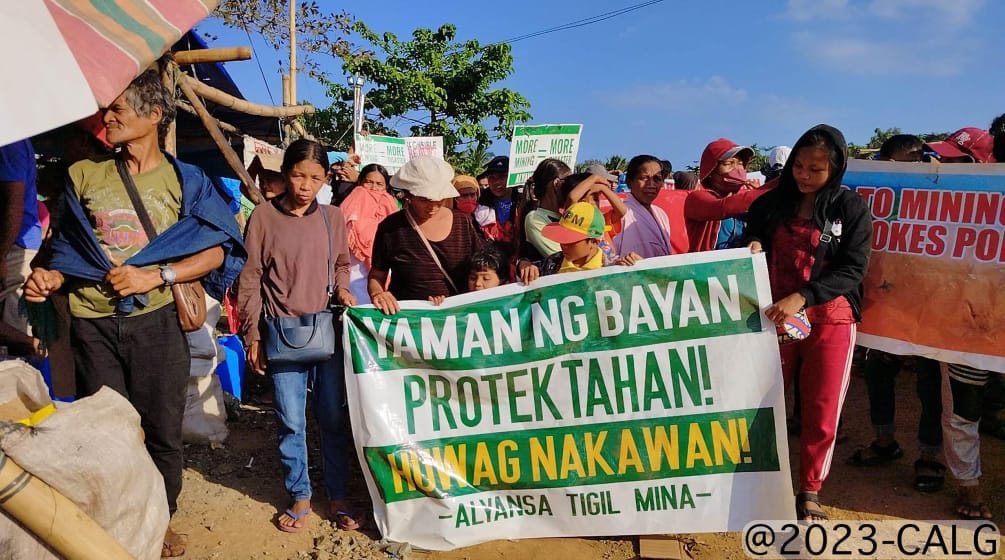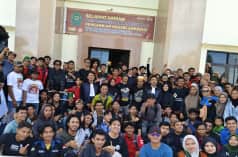Philippines: Violence against peaceful blockade of illegal nickel mine
 Banner: “Protect the wealth of the people! Stop the theft! Alliance Against Mining” (© CALG)
Banner: “Protect the wealth of the people! Stop the theft! Alliance Against Mining” (© CALG)
Apr 26, 2023
Since mid-February, the community of Brooke’s Point on the Philippine island of Palawan has been protesting against Ipilan Nickel Corporation (INC). The company does not have an operating permit and the blockade had been officially authorized. Company security forces and the police nevertheless took violent action against the protesters.
The Palawan archipelago in the west of the Philippine archipelago has been a UNESCO Biosphere Reserve since 1990 thanks to its unique natural heritage. It is home to isolated and declining Indigenous communities and habitat of 49 animal and 56 plant species on the IUCN Red List of Threatened Species.
For many years, local communities have been fighting the destruction of nature by industrial agriculture and mining companies that operate with complete impunity, even in protected areas.
Barricades to protect nature
On February 18 of this year, residents of Brooke’s Point in southern Palawan erected a barricade to stop mining activities by Ipilan Nickel Corporation. They are supported by Rainforest Rescue’s long-standing partner network, the Coalition Against Land Grabbing (CALG).
“The company invaded a particularly biodiverse forest area in Palawan,” said a participant in the blockade, a member of the Indigenous Pala’wan. “They don’t have an operating permit – they have to leave.”
Local authorities had previously prepared a comprehensive land use plan for Brooke’s Point and established that mining would not be permitted in the community. The Department of Environment and Natural Resources (DENR) confirmed this decision. Furthermore, part of the land claimed by the mining company is located in the Mount Mantalingahan Protected Landscape, an area of great biodiversity and one of only ten places identified by the Alliance for Zero Extinction as the last habitats of highly endangered species in the Philippines. It is also one of the eleven most important bird sanctuaries in Palawan.
Indigenous peoples and local residents erected barricades to protect this paradise of biological and cultural diversity against exploitation by mining companies. The communities consider these measures to be their last resorts to stop the ongoing destruction.
The law is on the side of local communities
“Right now, I don't see any viable alternatives for people to express their opposition to mining,” said Brooke’s Point Deputy Mayor Jean Feliciano. “Our residents had no choice but to organize a barricade as the Ipilan Nickel Corporation continues to operate despite the mayor’s order to cease operations.”
“We Palawaños can survive economically without mining and our province can continue to thrive on tourism, agriculture and fisheries alone. Yet our paradise will remain in danger as long as the European Union and other industrialized countries continue to import nickel. Not even our barricades can prevent that. Nickel and other metals needed for the energy transition are currently in high demand worldwide. Most of them come from tropical countries like ours,” says Sisang De La Cruz of the Coalition Against Land Grabbing.
The mayor of Brooke’s Point had already extended the assembly permit granted to participants in the blockade twice, into April.
Violence against peaceful protesters
On April 14, the situation escalated: Company security personnel and police violently broke up the peaceful demonstration and arrested protesters. Videos taken by participants in the blockade show how a mining company can take the law into its own hands, completely disregarding local government authorities and the legitimate rights of citizens.
For this reason, the Brooke’s Point Municipal Council is calling on the chief of police of Palawan province to fire the local police chief for not stepping in against the violent dispersal and arrest of mining opponents.
Ipilan Nickel Corporation is part of Global Ferronickel Holdings, Inc. (FNI), a corporation listed on the Philippine Stock Exchange. Its business areas include mining and processing of nickel ore, logistics and port operations, cement and steel production.
The global demand for nickel is increasing dramatically – it is mainly used for the production of stainless steel and increasingly also for batteries.











